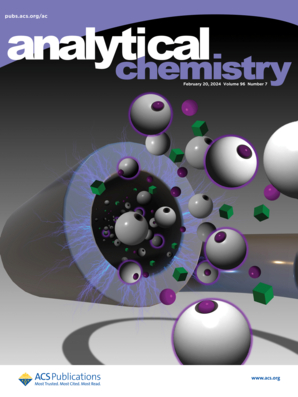Global Methylation Profiling by Selective Release of Methylated Sites from Immobilized Tryptic Peptides
IF 6.7
1区 化学
Q1 CHEMISTRY, ANALYTICAL
引用次数: 0
Abstract
Methylation of lysine and arginine (K and R) has emerged as a prevalent post-translational modification with critical roles in numerous biological processes. The current identification approaches suffer from suboptimal enrichment efficiency, particularly for lysine methylation, hindering comprehensive KR methylome profiling. Herein, we presented an antibody-free strategy termed Selective Release of Methylated Sites from Immobilized Tryptic Peptides (SRMs-ITP), which achieves high enrichment efficiency while enabling the simultaneous analysis of all five methylation states of KR. This strategy exploits the unique ability of LysargiNase to cleave methylated KR residues, which are absent in trypsin-based digestion. Totally, our approach identified 5516 methylation sites across 2866 proteins from HeLa cell lysate, including 2405 arginine methylation sites and 3111 lysine methylation sites. SRMs-ITP achieved an enrichment efficiency exceeding 48.2%, significantly outperforming current antibody-based and antibody-free strategies. Notably, 56.4% of the detected methylation sites were on lysine residues, surpassing the existing antibody-free approaches. These findings establish SRMs-ITP as a robust, unbiased, and highly efficient methodology for KR methylome analysis. The approach offers a powerful tool for deciphering the intricate regulatory mechanisms of protein methylation and its cross-talk with other post-translational modifications under various physiological and pathological conditions.

通过选择性释放固定色氨酸甲基化位点的全局甲基化分析
赖氨酸和精氨酸(K和R)的甲基化已经成为一种普遍的翻译后修饰,在许多生物过程中起着关键作用。目前的鉴定方法富集效率不理想,特别是赖氨酸甲基化,阻碍了全面的KR甲基组分析。在此,我们提出了一种无抗体的策略,称为从固定化胰蛋白酶中选择性释放甲基化位点(SRMs-ITP),该策略实现了高富集效率,同时能够同时分析KR的所有五种甲基化状态。该策略利用了LysargiNase切割甲基化KR残基的独特能力,这在胰蛋白酶消化中是不存在的。总的来说,我们的方法在HeLa细胞裂解物的2866个蛋白质中鉴定了5516个甲基化位点,其中包括2405个精氨酸甲基化位点和3111个赖氨酸甲基化位点。SRMs-ITP的富集效率超过48.2%,显著优于目前基于抗体和无抗体的策略。值得注意的是,56.4%的甲基化位点位于赖氨酸残基上,超过了现有的无抗体方法。这些发现确立了SRMs-ITP作为一种稳健、公正、高效的KR甲基组分析方法。该方法为破译蛋白质甲基化的复杂调控机制及其在各种生理和病理条件下与其他翻译后修饰的串扰提供了有力的工具。
本文章由计算机程序翻译,如有差异,请以英文原文为准。
求助全文
约1分钟内获得全文
求助全文
来源期刊

Analytical Chemistry
化学-分析化学
CiteScore
12.10
自引率
12.20%
发文量
1949
审稿时长
1.4 months
期刊介绍:
Analytical Chemistry, a peer-reviewed research journal, focuses on disseminating new and original knowledge across all branches of analytical chemistry. Fundamental articles may explore general principles of chemical measurement science and need not directly address existing or potential analytical methodology. They can be entirely theoretical or report experimental results. Contributions may cover various phases of analytical operations, including sampling, bioanalysis, electrochemistry, mass spectrometry, microscale and nanoscale systems, environmental analysis, separations, spectroscopy, chemical reactions and selectivity, instrumentation, imaging, surface analysis, and data processing. Papers discussing known analytical methods should present a significant, original application of the method, a notable improvement, or results on an important analyte.
 求助内容:
求助内容: 应助结果提醒方式:
应助结果提醒方式:


